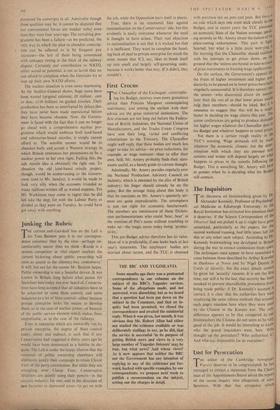First Crocus
rrtie Chancellor of the Exchequer, contemplat- ing his Budget, receives even more gratuitous advice than Princess Margaret contemplating matrimony; and among the earliest with their advice are the great -industrial institutions. The first crocuses are not long out before the Federa- tion of British Industries, the National Union of Manufacturers, and the Trades Union Congress have sent their long, varied and conflicting exhortations to the Treasury. The Chancellor might well reply that these bodies are much less eager to take his advice—on price reductions, for example, or wage restraint—than to offer their own. Still, Mr. Amory probably finds their state- ments useful, as a handy guide to current thought.
Admittedly, Mr. Amory presides regularly over the National Production Advisory Council on Industry. which is attended by the elite of British industry; his finger should already be on the pulse, But the strange thing about this body is that its reactions to Mr. Amory's quarterly ser- mon are quite unpredictable. The atmosphere is just not right for economic hatchetwork. The members are reminiscent of those Dicken- sian parliamentarians who could 'hear, hear' at the mention of Pitt's name without troubling to wake up--the magic name today being 'produc- tivity.'
This pre-Budget advice therefore has its value. Most of it is predictable, if one looks back at last year's statements. The employers' bodies are worried about surtax, and the TUC is obsessed
with purchase tax on pots and pans. But then: Is no rule which says one must stick closely to the Budget, and in recent years the TUC presented an economic State of the Nation message, sP"k: ing severely to Mr. Amory about the failure of hu price-cutting exhortations. This part is light" hearted, but what is a little more worrying is the warning that the Chancellor should continue with his attempts to get prices down, on the ground that the 'unions are bound to take acc.noot, of price movements in framing wage applications. On the surface, the Government's appeals for the fruits of higher investment and higher elo* ductivity to be passed on in lower prices have been singularly unsuccessful. It is therefore natural that the unions—who discovered about Six months later than the rest of us that lower prices Would help their members—should be irked. But it is nonsense to suggest that this will be a major factor in deciding on wage claims this year. The union conferences are going to produce demands for higher wages whatever the Chancellor does in his Budget and whatever happens to retail prices' Yet there is a certain rough reality in the TUC"s warning. Wage demands will be made whatever the economic climate; but the deter' mination with which they are pursued next autumn and winter will depend largely on what happens to prices. in the months following the Budget. This is something Mr. Amory Will have to ponder when he is deciding what his Budgeti r.
will contain.


































 Previous page
Previous page